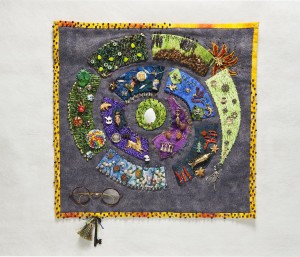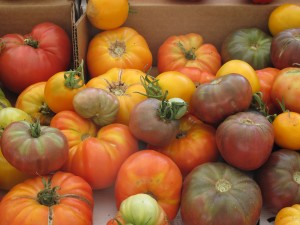The other day, I stumbled on a statistic that took my breath away. According to the Washington Post (which seems to be quoting a study in the Journal of the Royal Society of Biological Science), the average US household discards between $1400 and $2300 worth of food annually. In fact, approximately 40% of the edible food produced in the United States is thrown out annually – for all sorts of reasons (from it isn’t aesthetically pleasing (!) to recalls of certain items) and from all sorts of venues (farms, restaurants, packaging plants, grocery stores, and houses).
To get a little bit of a handle on that, my husband and I budget $600 per month for food – which includes the $60 – $75 worth of groceries we take to our congregation’s monthly canned goods collection – which means that the average household throws away somewhere between 2 and 4 months worth of our food every year. And actually throws it away in landfills where it rots and gives off methane gas, rather than composting it for reuse and renewal of the land. Only about 12% of what is discarded is composted.
This is a practical, economic, and – above all – spiritual concern. And it is a concern that applies not only to our literal food, but to our harvests of labor, love, talent, compassion, justice, truth. But let’s start with the literal.
When I was a child, I was told to clean my plate because there were children starving in Africa. Almost everyone my age was told some version of that, by parents and grandparents who had lived through the Depression and for whom going hungry was very very real. We laugh about it now. It is one of those irritating moral lessons that (G-d forbid!) we certainly didn’t want to pass along to our own children lest we make them feel guilty. After all, it wasn’t as if we could pack up our uneaten corn flakes, dripping with milk, and mail them to some starving child on another continent.
Guilt has become a concept from which we should run as fast and as far as possible. Except. Except, that statistic haunts me, and suggests that maybe some healthy guilt is not such a bad thing. If I actually eliminated the food from my pantry and didn’t immediately replace it with something else, if the shelf was left empty where that food had been, I would be forced to fast between one day out of every six and one day out of every three. ‘Fasting’ as in ‘not eating any food.’ If we actually cut our food intake by that $2000 worth of food each year, we would be eating closer to the way most of the world eats. Including people in houses less than one mile from where I live in metro Denver.
You can look at that as a reality check or you can look at it as a spiritual discipline in which you wish to engage. And the spiritual discipline may be the fasting, or it may be setting aside $2000 from your own food budget, giving it to a local food bank, and then not throwing away any food at all. You would end up in the same place financially, except your neighbor would be eating, too.
Which leads me to wonder what other sustaining goodness we routinely discard, from the old (but still usable) vacuum/dresser/medicine cabinet/rug we put out with the trash rather than load in the car and take to Goodwill, to the time I waste on computer games, to a thoughtless vote for the convenient option rather than the just or sustainable or equitable option, to the money (labor) I throw away on some fad, to my contentment with illusion when I know the truth (but don’t want to know that I know it.)
 The truth is that we either sustain or we waste the world with every decision we make. I will never have the satisfaction of knowing that this one thing I just did saved the entire world from mass starvation or outright annihilation. None of us will. But I can do what I can do, steadily, attentively, unflinchingly, one meal at a time, one vote at a time, one hour at a time. And it will make a difference. I can choose to know that or to not know it. I can value every breath, every moment, every apple (or pair of shoes or chance to share) or I can throw it away waiting for “a better opportunity”. And what I am throwing away is, quite simply, my life.
The truth is that we either sustain or we waste the world with every decision we make. I will never have the satisfaction of knowing that this one thing I just did saved the entire world from mass starvation or outright annihilation. None of us will. But I can do what I can do, steadily, attentively, unflinchingly, one meal at a time, one vote at a time, one hour at a time. And it will make a difference. I can choose to know that or to not know it. I can value every breath, every moment, every apple (or pair of shoes or chance to share) or I can throw it away waiting for “a better opportunity”. And what I am throwing away is, quite simply, my life.
There is an ancient Hebrew tradition that tells us that as long as there are ten righteous people living, G-d will not destroy the world. We never know who they are, we only know that as long as the world exists, those ten are out there somewhere. Sometimes it feels like we have a more than sufficient number, well more than the necessary ten. Sometimes it feels like we have nine with the flu, and one on a deathbed somewhere — and we are all just hanging on by our fingernails. I wonder why we are willing, so often, to bet on the good will of everyone else, as if I am too important to be bothered. What if I am the tenth in one of those perilous times? I will never know, so I have a choice: I can live as if I am, or I can take the chance and hope that someone else out there will be willing to do it. I can choose to live as if I matter, or I can choose to live as if I don’t. I can cherish life or I can throw it away.
When I put it like that, the choice is abundantly clear.
–Andrea
Text © 2014, Andrea La Sonde Anastos
Photo of tomatoes © 2014, Immram Chara, LLC
Photo of fiber piece © 2013, Jon Wallen
NOTE: The photo of tomatoes is available as a card or print this season in my Etsy shop.
